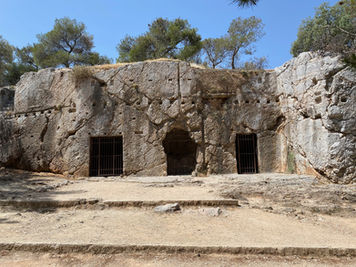MY APOLOGY
In 399 B.C. a trial was held in ancient Greece against the philosopher Socrates. He was charged in two counts: impiety against the gods of Athens, and corrupting the Athenian youth. Plato, Socrates most well-known student, documented Socrates' statements of his defence in the famous text "Apology."
In his statement of defence, Socrates assumes the role of the accuser against his accusers. He exposes their lies and hypocrisy, and sheds light on their corrupted power. Most of all, his "apology" is an indictment against authority who fears the freedom of thought, and the potential dangers of such a regime. Socrates' defence does not persuade the people of Athens, and he is found guilty and a death sentence is then issued.
This solo performance re-introduced Socrates' defence to the Athenian people, its original audience, some 2,400 years later. This piece sought to examine their reaction to it.
In three central locations in Athens, and perhaps the busiest public spaces in the city - the Acropolis, Socrates' Prison, and Ermou street - Kfir Lapid performed the entire text of the "Apology." Utilizing the technique of headphones verbatim, Kfir first recorded the text, and then performed it, word-for-word, in public before the Athenian people and the numerous tourists visiting these attractions. Not only was Kfir's speech directed at the public, but also his video camera. Mounted on his body, Kfir camera recorded the public's reactions to the performance, or lack thereof. Among the reactions were people who asked Kfir to move so that they can snap a photo; asking for direction on how to get somewhere; and embarrassed laughter. However, primarily, the performance was met with the passer-by ignoring and disregarding the performer, presenting indifference.
Throughout history, the freedom of thought and the freedom of artistic expression were, and still are, jeopardized by a breadth of powerful forces: by authoritarian demands for obedience and conformity, by censorious administrative rejection of contestation, and also, in the age of new media, by reductive, self-righteous and intolerant approaches towards ideas with which we do not agree. This performance was aimed at opposing such powerful forces with the performer's presence and speech, reviving the words of Socrates who was sentenced to death for speaking truth to power.
The solo performance took place in Athens, Greece, over the course of three days, 27-29 May, 2022.









